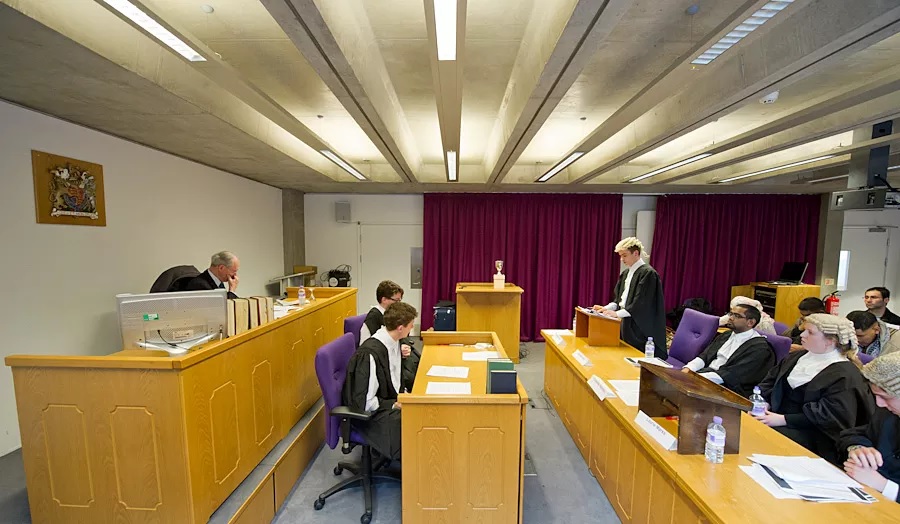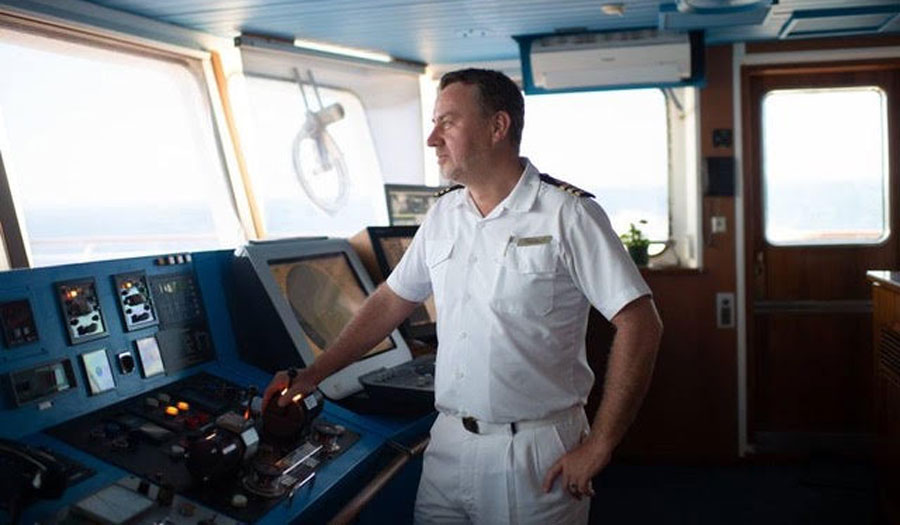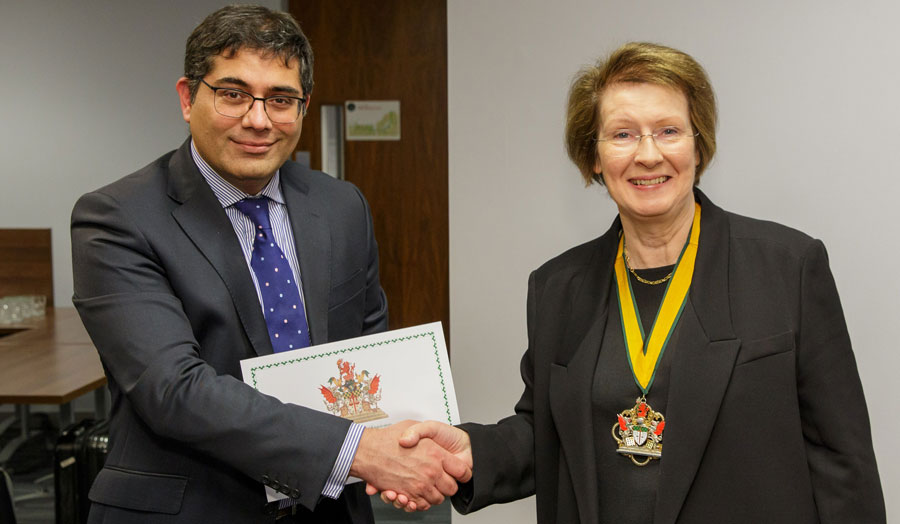Apply for this course
Please select when you would like to start:
Use the apply button to begin your application for the Maritime Law LLM. Please note, the following PG Cert and PG Dip options are also available:
Apply for the PG Cert
Apply for the PG Dip
If you require a student visa and wish to study on a part-time basis, please read our how to apply information for international students to ensure you have all the details you need about the application process.
Why study this course?
Designed for professionals working in maritime and international trade sectors, you'll develop practical knowledge in how international sales contracts are made and enforced, plus how to advise on maritime claims.
These courses are taught online, so you have the freedom to learn from wherever you are in the world. We offer this programme as either an LLM (Master of Laws), postgraduate diploma or postgraduate certificate.
Deepen your knowledge of the sector
Designed for professionals working in maritime and international trade sectors, this course will help you develop practical knowledge in how international sales contracts are made and enforced, plus how to advise on maritime claims
Study in a way that suits you
This are taught online, so you have the freedom to learn from wherever you are in the world
Take your career prospects to the next level
Our courses are suitable if you're a legal practitioner in this industry, an academic, or if you're a non legal professional working in the shipping industry
Course modules
The modules listed below are for the academic year 2024/25 and represent the course modules at this time. Modules and module details (including, but not limited to, location and time) are subject to change over time.
Year modules
Law Dissertation
This module currently runs:summer studies - Wednesday evening
(alternative core, 60 credits)
This module is a supervised research-based dissertation in a relevant subject of the student’s own choice, subject to the approval of the Course Director.
The dissertation module comprises support and interactive ‘one to one’ supervision between students and supervisors. The minimal expectation for contact between student and supervisor is around 5 hours, but this can be greater depending on the individual dissertation and specific needs of the supervisor.
MODULE AIMS
On successful completion of this module, you will be able to:
- write a level 7 dissertation of up to 12,000 words in length.
- demonstrate a grounded and evidenced understanding of appropriate research questions, materials and examples suitable for writing a dissertation in a legal area.
- employ appropriate techniques for information gathering, research and critical analysis of leading legal questions.
- adopt a structured approach to the production of a sustained and critical piece of academic research of between 10,000 to 12,000 words on a law related subject.
- practise the fundamental academic and professional skills necessary for practical and effective postgraduate study of law.
Law Experiential Learning Project
This module currently runs:spring semester - Wednesday evening
summer studies - Wednesday evening
(alternative core, 60 credits)
This module provides you with the opportunity to showcase your professional skills in the execution of law-related tasks and experiential learning. When executing legal tasks, successful practitioners are able critically to evaluate law-related matters from an elevated perspective and are able to draw upon a varied knowledge base to assist in the development of strategy, new ideas, recommendations and solutions that add value to their organisation. Furthermore, successful legal practitioners draw upon a wide range of knowledge to help shape their own behaviour, character and identity. By critically reflecting on their experiences in work, they are able to develop an acute awareness of their own capabilities and skills, and have the ability to understand how they personally add value to an organisation. It is the application of knowledge and utilisation of professional skills that is explored in this module.
The first week of the year long programme will be dedicated to the discussion of various aspects of the work placement. This will lead to the production of a substantial report that helps to investigates specific legal issues within an organisation. This is a significant independent project, where you determine the subjects to be investigated and the methodology to be followed. Your project is an ideal opportunity to seek out and draw upon a wide range of knowledge, and for you to demonstrate how this underpins any final conclusions and recommendations. Your project will help you demonstrate your ability to think and act independently when executing a complex and challenging task.
The remaining period is dedicated to experiential learning in a work placement or project with an employer, which you will have secured during your time on programme. This practical experience will allow you to explore and test your own professional competence in a specific working environment. You will maintain a Professional Development portfolio of your experiences and will, ultimately, be able to articulate your understanding of how you personally add value in a professional legal context. Again, you will be expected to draw on a wide range of knowledge to help evaluate and explain your experiences.
Module Aims
On successful completion of this module, you will be able to:
- carry-out an in-depth project where you can integrate the legal knowledge and professional skills you have gained throughout your programme;
- identify and utilise different types of legal knowledge to influence your thinking or action;
- develop robust legal research skills and an ability to formulate new ideas and solutions through the analysis of primary and/or secondary data;
- explore your own skills, character and identity within a professional environment and identify key attributes that will aid long-term success in your chosen career field;
- develop good reflective practice, ensuring models and concepts can be used effectively in the critical evaluation of your performance; and
- integrate knowledge, experience and reflective practice to continually develop your professional skills and competence.
Carriage of Goods by Sea I: Charterparties
This module currently runs:autumn semester - Tuesday evening
spring semester - Thursday evening
(option, 20 credits)
The module examines rights and obligations arising when goods are carried by sea, focusing on charterparties.
The module covers the following themes: formation, types of carriage contracts and interpretation of their terms; seaworthiness; reasonable dispatch, deviation, safe ports.
Specific attention is devoted to time-charterparties including the following elements: early and late redelivery of the vessel, the obligation of the charterer to pay hire, withdrawal of the ship by the owner, off hire clauses, deductions from hire.
Voyage charterparties are also examined in depth, with emphasis on the following subjects: freight, beginning of laytime, the question of when a ship is an “arrived ship”, notice of readiness, demurrage and the right to terminate.
MODULE AIMS
- The aim of this module is for students to be able to:
- learn about the most common contracts of carriage of goods by sea and the legal relationships stemming from them.
- learn about the formation of charterparties, their terms and their interpretation
- understand the rights and obligations of owners and charterers in voyage and time charterparties through case law and examples, so that they can advise clients with their charterparty disputes.
- develop their ability to apply knowledge through a series of practical exercises.
- develop their ability to construct legal arguments.
Carriage of Goods by Sea II: Charterparties
This module currently runs:spring semester - Thursday evening
(option, 20 credits)
The module focuses on bills of lading, their types and their functions in international trade. Particular analysis will be devoted to the Hague-Visby Rules.
MODULE AIMS
The aim of this module is for students to be able to:
- learn about the different types of bills of lading
- understand the functions of bills of lading
- know when the Hague-Visby Rules apply.
- develop their ability to apply knowledge through a series of practical exercises.
- develop their ability to construct legal arguments.
Financing of International Sales
This module currently runs:spring semester - Thursday evening
(option, 20 credits)
This module offers an introduction to documentary credits. Students will learn about the function of a letter of credit.
MODULE AIMS
On successful completion of this module, the students will be able to:
- critically research, analyse and debate contemporary legal issues surrounding international trade, such as comparing, contrasting and evaluating conflicting views, in a cogent and measured written presentation.
- independently research and advise on problem-based case studies, involving synthesis, critical analysis, appraisal and the application of the principles of international trade law.
- develop their ability to apply knowledge through a series of practical exercises.
- develop their ability to construct legal arguments.
International Commercial Arbitration
This module currently runs:spring semester - Thursday evening
autumn semester - Tuesday evening
(option, 20 credits)
Arbitration is an alternative dispute resolution method which is frequently chosen in commercial and maritime disputes.
Students on this module will develop a comprehensive understanding of the legal issues attached to international arbitration, from the formation of the arbitration agreement until the enforcement of the arbitral award.
MODULE AIMS
The aim of this module is for students to be able to:
- understand the complexities surrounding the inclusion of an arbitration agreement in a commercial contract
- learn important principles and concepts of arbitration
- critically engage with relevant case law
- ascertain the various stages involved in arbitration, beginning with the arbitration agreement and extending to a possible challenge or enforcement of an arbitral award
International Sale of Goods
This module currently runs:spring semester - Thursday evening
autumn semester - Tuesday evening
(option, 20 credits)
Shipping and cross-border trade are interrelated in both pragmatic and legal terms.
This module enables students to obtain a deep understanding of the context and characteristics of international sale contracts concluded on shipment terms. Students will learn about the importance of English law in international trade. They will also be able to distinguish between the physical and documentary duties of the trade protagonists under a sale contract, understand the cardinal role of the bill of lading in shipping and commerce and the importance of the proper drafting of the sale and carriage contracts respectively.
By the end of the module, the students will be able to identify, decipher and debate relevant legal issues arising from international commercial law disputes. They will have the expertise to scrutinise sale contracts on shipment terms and advise the buyer and seller as to their respective rights and liabilities, with reference to English law.
MODULE AIMS
The aim of this module is for students to be able to:
- learn about CIF and FOB contracts
- understand the importance of physical and documentary duties
- know the main obligations of sellers and buyers in CIF and FOB contracts
- evaluate the importance of English law, when it is the governing law of the contract
- learn and apply the law to case studies
Oil Pollution from Shipping
This module currently runs:spring semester - Tuesday evening
(option, 20 credits)
In this module, the international convention regime which has emerged to establish the legal framework determining he rights and compensation available in respect of oil pollution caused by ships is identified an analysed.
The elements of the international convention regime are, in certain areas, widely established and form the basis of the national law of a substantive number of states. Where this is the case, it can be validly said that an international consensus has emerged, but this experience is not universal. The attempts at promulgating an international consensus have not always been successful Where this is the case, identifying the relevant legal regime may be less certain, and ship-source pollution may have to be considered in the context of the relevant law.
AIMS OF THE MODULE
On successful completion of this module, you will be able to:
- identify relevant conventions, legislation and voluntary arrangements in relation to oil pollution from shipping;
- analyse questions of liability and compensation which arise from oil pollution from shipping;
- understand the rights and obligations of shipowners, states and charterers in relation to oil pollution;
- develop your ability to apply knowledge through a series of practical exercises; and
- develop your ability to construct legal arguments.
Research Methods for Lawyers
This module currently runs:autumn semester - Wednesday evening
spring semester - Wednesday evening
(option, 20 credits)
Research Methods for Lawyers, which is offered in both the autumn and spring semesters, provides a detailed understanding of how to prepare for writing a dissertation on a legal topic.
Students will be given practical guidance on how to conduct advanced legal research from both primary and secondary sources; how to choose a viable research topic; how to write a research proposal; how to conduct a literature review; and how to choose the right methods and methodology for the dissertation.
In doing this, the students will be preparing themselves for conducting legal research in both an academic and professional field, as well as for writing a research dissertation at Level 7.
MODULE AIMS
On successful completion of this module, you will have:
- acquired advanced knowledge of how to conduct independent legal research and how to organise, assemble and synthesise large amounts of legal material in order to identify legal problems.
- developed several key transferable skills, including independent research, critical analysis and cogent academic writing in the context of writing a research dissertation, emphasising the use of primary and secondary sources.
- enhanced your employability by the development both of these skills, and by the practice of written communication activities (including summative) and oral communication activities (formative only)
The English Legal System and Commercial Law
This module currently runs:autumn semester - Wednesday evening
spring semester - Wednesday evening
(option, 20 credits)
You may be coming to this course with no prior knowledge of the components of the English legal system, or only a vague idea of how litigation and alternative dispute resolution operates within that system. Whilst it is possible to study a specific area of law without this broader knowledge, you will get a great deal more out of the course if you can contextualise it within the framework of legal practice, especially insofar as it relates to civil law and procedure.
This module will introduce you to the workings of the English Legal System in its historical, contemporary and international context. You will also have an introduction to aspects of commercial law, including contract and tort.
It includes the study of the sources of law; the law-making process; the institutional and court structure; and basic issues of civil procedure within the English Legal system.
You will also benefit from an introduction to legal method, which will introduce you to methods of legal research, analysis and logic; to a practical knowledge of the legal profession and careers; and to issues of judicial ethics.
MODULE AIMS
On successful completion of this module, you will be able to do the following:
- Reflect on the legal system in the context of contemporary legal issues.
- Demonstrate a working knowledge of legal language, sources of English law and legal procedure;
- Read and understand primary and secondary sources of law (paper based and electronic);
- Practise the fundamental academic and professional skills necessary for practical and effective postgraduate study of law.




















